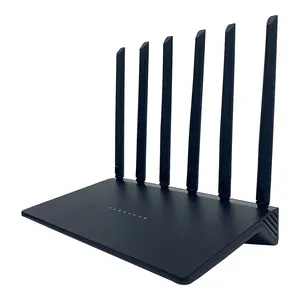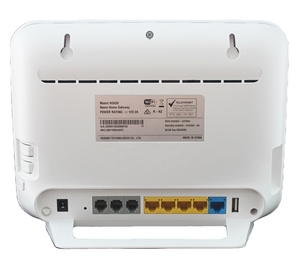
All categories
Featured selections
Trade Assurance
Buyer Central
Help Center
Get the app
Become a supplier

(257 products available)











































VDSL2 modems, which are often referred to as VDSL2 routers, are designed for high-speed internet access over copper telephone lines, and they come in several different types depending on their features and functionality.
The main function of a VDSL2 modem is to provide internet access over copper telephone lines. The key features of these modems include support for multiple VDSL2 profiles, backward compatibility, VoIP support, dual-band Wi-Fi, and security features.
Multiple VDSL2 Profiles
A modem that supports multiple VDSL2 profiles will provide internet access at various speeds. The profiles are different configurations of VDSL2 that provide varying maximum download and upload speeds. The profiles also have different frequency bands, which allow internet access over longer distances. A VDSL2 modem can use profiles P, T, or G, where G.ton is the one used for normal telephone lines.
Backward Compatibility
VDSL2 modems are made to be backward compatible with the older ADSL and ADSL2 technology. This allows them to be used by customers who are still on those networks. The backward compatibility ensures that the modem will work with older technology and provide internet access. It will also allow users to upgrade to VDSL2 or higher when it becomes available in their area.
VoIP Support
A VDSL2 modem with phone support will allow users to make Voice over Internet Protocol (VoIP) calls. VoIP technology converts voices into digital signals that are sent over the internet. The modem has integrated telephone ports that connect to VoIP service. It also has the necessary hardware, such as a voice processor, to ensure good call quality. The VoIP service will reduce the cost of making calls.
Dual Band Wi-Fi
Many modems that come with VDSL2 enabled have dual-band Wi-Fi. This allows them to broadcast Wi-Fi on the 2.4 GHz and 5 GHz bands. The 5 GHz band offers higher speeds. It is good for devices close to the modem. The 2.4 GHz band provides better range for devices that are far from the modem. Dual-band Wi-Fi allows multiple devices to use the band that gives the best performance.
Security Features
VDSL2 modems have security features that protect against potential threats and ensure secure internet access. The features include a firewall, virtual private network (VPN) support, and intrusion detection. The modems have encryption, such as Wi-Fi protected access (WPA) and WEP, to keep data safe and to prevent unauthorized access. The security features will protect the network from hackers and cyber threats.
The VDSL2 modem is for home and office uses and has various applications. Here are some usage scenarios of a VDSL2 modem.
Stream Multimedia Content
VDSL2 technology provides a high and stable internet speed suitable for streaming videos and audios. People can use the VDSL2 modem to stream multimedia on popular websites like Netflix with minimal buffering.
Online Gaming
In a world where virtual reality games require immersive experiences, a stable and low-latency internet connection is essential. The VDSL2 modem gives gamers fast and responsive internet.
Work From Home
For telecommuters, the VDSL2 modem is a reliable internet option. It offers large upload speeds for sending emails, participating in video conferences, and sharing projects. Many work-from-home employees use the VDSL modem.
Small Businesses
Small business owners with a business internet connection can use the VDSL2 modem. It is affordable and gives the bandwidth needed for business tasks like video conferencing, uploading large files, and internet tasks.
Education
Students, teachers, and virtual learners need a reliable internet connection to access online courses and learning materials. The VDSL2 modem provides a suitable broadband solution for effective online learning and distant education.
IPTV Services
In the past years, VDSL technology has been catching up with cable modems. IPTV service providers can use the VDSL2 modem for their clients. The modem can deliver TV channels and internet services at the same time.
VoIP Telephone Services
Companies providing VoIP telephone services can use the VDSL2 modem to serve various customers, including residential and small business users. The modem enables voice communication and internet connection at the same time.
Surveillance Cameras
Surveillance and security cameras need a stable internet connection for effective remote monitoring. The VDSL2 provides higher speed than ADSL, enabling smooth transmission of large footage from the cameras.
Digital Marketing
Digital marketing tasks like content creation, social media marketing, and email marketing require a responsive internet connection. A VDSL2 modem gives marketers the bandwidth for successful digital marketing campaigns.
Medical Services
In telemedicine, healthcare providers can use the VDSL2 modem to transmit data between remote patient monitoring devices. The modem has low latency for quick response and data transfer in telemedicine.
When choosing a VDSL2 modem to resell, buyers should be the ones to decide the right type based on their individual needs, preferences, and uses. However, buyers should consider these additional customer preferences that can help them decide the right quantity and types to purchase.
Consider the VDSL2 modem type. Some customers prefer standalone modems, while others enjoy modems with routers. Standalone modems are liked for their simplicity, while modems with routers are popular for their network sharing capability and for providing additional features like firewalls. Many manufacturers now offer VDSL2 integrated modem router options.
Check the number of ports available on the device. A device with one ethernet port will work when connecting a single device. However, devices with multiple ethernet ports give users the ability to connect several devices directly to the modem, without any additional hardware like a switch or router. These modems are perfect for homes and small offices that have many devices requiring wired connections to the network.
Consider the device's ability to deliver both wired and wireless connections to the Internet. This is determined by the integrated modem's capability of communicating with the VDSL network and the router's ability of broadcasting the Internet throughout the home via Wi-Fi. Sometimes, the two functions are separated into distinct components - a modem and a router, but they can also be combined into a single integrated device.
The frequency of the router is another important factor to consider. Dual-band routers are better at providing Internet connections with less interference and at higher speeds because they transmit Wi-Fi signals at two distinct frequencies: 5GHz and 2.4GHz.
Make sure the product is compatible with the buyer's VDSL2 service and phone line. Also, verify if the modem has an FCC approval certification. Although it is not mandatory, it shows that the device can be legally used in the U.S. and that it meets the basic standards for electromagnetic interference).
Buy modems designed for easy installation. Many manufacturers are now offering plug and play modems that are fast and simple to set up. The device doesn't need to be manually configured with the Internet settings provided by the ISP.
Finally, examine the modem's after-sale service and warranty. Look for manufacturers that provide technical support and can cater to any inquiries or confusion regarding connection issues.
Q: What does VDSL2 mean?
A: VDSL2 stands for Very-high-bit-rate Digital Subscriber Line 2. It's a high-speed internet connection that works over telephone lines. It's faster than regular DSL and allows more people to use the internet at the same time.
Q: What is the difference between VDSL and cable?
A: The difference between VDSL and cable is that VDSL uses telephone lines to provide internet service, while cable internet uses coaxial cable TV lines. Cable internet generally offers faster download speeds than VDSL, but VDSL can provide faster uploads.
Q: Does a VDSL2 modem router make a difference?
A: A VDSL2 modem router can make a difference because it is specifically designed to work with VDSL2 technology. It can provide better performance and stability for VDSL2 connections than a modem router that is only designed for DSL or that supports multiple technologies, including VDSL2.
Q: Does a VDSL2 modem need a phone line?
A: Yes, a VDSL2 modem needs a phone line. The modem uses the phone line to get the VDSL2 internet signal.
Q: What equipment is needed for VDSL2?
A: The equipment needed for VDSL2 includes a VDSL2 modem, which connects to a phone line and a computer or router. In addition, a VDSL2 splitter or filter may be required to separate the VDSL2 signal from the voice signal on the same phone line.